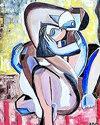Could it be that what I’m writing to you is Behind Thought?
IF 0.3
4区 社会学
0 HUMANITIES, MULTIDISCIPLINARY
ANGELAKI-JOURNAL OF THE THEORETICAL HUMANITIES
Pub Date : 2023-03-04
DOI:10.1080/0969725X.2023.2192073
引用次数: 0
Abstract
Abstract This text gives an account of the experience of reading Clarice Lispector’s Água Viva in the form of a brief dialogue with the text. It foregrounds the writing voice’s address of a second person and the attention this address brings to the acts of writing and reading that hold the two pronouns in relation, producing at once an infinite and nonexistent distance from being to being. The dialogue observes Lispector’s insistent return to the formulation “atrás do pensamento,” which has been translated into English as “beyond thought” and can also be translated as “behind-thought” or as the background of thought, in a more spatial sense. Nancy reads the translation into French, where this spatial nuance is preserved, in consultation with Lusophone interlocutors about the specificities of the Portuguese original. The dialogue interrogates the link across this dimension, the recurrence of the pronoun it in the original Portuguese version of Água Viva, and the acts of writing and reading a text that brings awareness to a living, pulsing, ongoing, and escaping instant beyond meaning that is nonetheless the cause of the address in the first place. The dialogue follows the thread of this movement as it slips out behind thought, where Água Viva meets other books attuned to the instant and in which the dialogue’s “I” feels their vitalizing effects.可能是我给你写的是《思想背后》吗?
摘要本文以与文本的简短对话的形式,讲述了阅读Clarice Lispector的《Água Viva》的经历。它预示着书写声音对第二人称的称呼,以及这个称呼给书写和阅读行为带来的关注,这两个代词保持着联系,同时产生了从存在到存在的无限而不存在的距离。对话观察到利斯佩克特坚持回归“atrás do pensamento”的提法,该提法已被翻译成英语“超越思想”,也可以被翻译成“思想背后”或更具空间意义的思想背景。Nancy在与葡语对话者就葡萄牙语原作的特殊性进行协商后,将译文翻译成法语,在法语中保留了这种空间上的细微差别。对话询问了这一维度上的联系,代词it在葡萄牙语原版《Água Viva》中的重复,以及书写和阅读文本的行为,这些行为让人意识到一种超越意义的鲜活、脉动、持续和逃避的瞬间,而这正是演讲的最初原因。对话遵循了这一运动的主线,因为它滑出了思想的后面,在那里,Água Viva遇到了其他适应当下的书籍,在对话中,“我”感受到了它们的生命力。
本文章由计算机程序翻译,如有差异,请以英文原文为准。
求助全文
约1分钟内获得全文
求助全文
来源期刊

ANGELAKI-JOURNAL OF THE THEORETICAL HUMANITIES
HUMANITIES, MULTIDISCIPLINARY-
CiteScore
0.60
自引率
33.30%
发文量
57
期刊介绍:
Angelaki: journal of the theoretical humanities was established in September 1993 to provide an international forum for vanguard work in the theoretical humanities. In itself a contentious category, "theoretical humanities" represents the productive nexus of work in the disciplinary fields of literary criticism and theory, philosophy, and cultural studies. The journal is dedicated to the refreshing of intellectual coordinates, and to the challenging and vivifying process of re-thinking. Angelaki: journal of the theoretical humanities encourages a critical engagement with theory in terms of disciplinary development and intellectual and political usefulness, the inquiry into and articulation of culture.
 求助内容:
求助内容: 应助结果提醒方式:
应助结果提醒方式:


